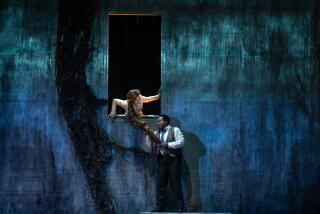Catching Debussy’s Elusive ‘Pelleas’
- Share via
During the past quarter-century there have been seven or eight commercial recordings of Debussy’s 1902 opera “Pelleas et Melisande,” to a text drawn from Maeterlick’s dense, otherwise long-forgotten symbolist play of the same name.
For one reason or another, all those recordings are unsatisfactory, either so heavily weighted toward the orchestra and a conductor’s “concept” (Karajan/EMI) that the singers become mere props, or because of damaging mis- or under-casting (Dutoit/London, Abbado/Deutsche Grammophon), or a lack of what is generally called “atmosphere” (Jordan/Erato).
Even in such a thoughtful effort as that led by Pierre Boulez (Sony), one has to lament how much better things could have been with just a bit more sensitivity, at the very least on the recording producer’s part.
Obviously, “Pelleas” is fragile goods, whose air of beguiling mystery is shattered by flaws that might elsewhere be regarded as negligible.
What a joy, then, to welcome two recordings of the opera that treat the work with such thoroughgoing sympathy and understanding: Philips’ reissue of its 1953 Paris recording, handsomely remastered on two mid-priced CDs (434 783), and what we used to call a “pirate” recording--unauthorized, but not actionably so (due to lax Italian copyright regulations)--of a 1969 Rome radio broadcast (Great Opera Performances 711, 3 CDs).
The Philips entry has as its first advantage the authentically French (as Debussy would have recognized it) playing of the Lamoureux Orchestra, particularly its flavorfully vibrating brasses, exemplifying a national style we regarded as dated and expendable a few decades back, and which many of us sorely miss in our own age of orchestral homogenization.
The conductor is the late Jean Fournet, a master of the idiom, leading an interpretation that stresses the score’s dark, surging drama without slighting its mysteries.
Outstanding in the cast is the Pelleas of the late Camille Maurane, a high, light baritone of the type specified by the composer, and for three decades among Europe’s foremost interpreters of the role. As a vocal actor, Maurane projects an excitable guilelessness, within a context of optimum vocal refinement.
His partner is the likewise recently deceased Janine Micheau, not the possessor of the ideally sweet and clean Melisande voice, but an artist of deep intelligence and verbal communicativeness.
Michel Roux’s very Gallic, nasal Golaud is explosive and winningly human as the opera’s catalytic center. And in the by-no-means-inconsequential secondary roles, Rita Gorr is a Genevieve of uncommon vocal richness, Xavier Depraz a mellifluous Arkel and Annik Simon an incisive, non-cloying Yniold.
The Rome radio transcription, in decent sonics, is led by Lorin Maazel, not today’s fussbudget, but the vital, 25-years-younger conductor who could be relied upon to seek out and project the subtleties and dramatic potential of the most elusive scores, among which “Pelleas et Melisande” surely ranks high.
The pacing is a good deal slower than Fournet’s and more traditionally “impressionist” in its moving about rather than zeroing in on a phrase. But in its discursive way Maazel’s interpretation is no less convincing than the Frenchman’s.
The Rome Radio Orchestra may not be one’s dream ensemble for this music, but the players--notably the solo winds--are consistently responsive to Maazel’s hardly simple demands.
Again, the cast is uniformly strong, with the sweet-voiced Henry Guy and the girlish-sounding Jeannette Pilou as the doomed titular couple. Gabriel Bacquier’s towering Golaud is perhaps the most sympathetic and pitiable on recordings, and vocally at least a match for Roux’s, while Nicola Zaccaria brings basso cantante warmth of tone and a wonderful feeling of aged wisdom to his Arkel.
The set, on three full-priced CDs, is uneconomical. There are no notes and the libretto is in French only, whereas the inexpensive Philips reissue gives us all the printed material we could require.
But these are two sides of a coin of inestimable value. It’s difficult to imagine being without either.
More to Read
The biggest entertainment stories
Get our big stories about Hollywood, film, television, music, arts, culture and more right in your inbox as soon as they publish.
You may occasionally receive promotional content from the Los Angeles Times.










